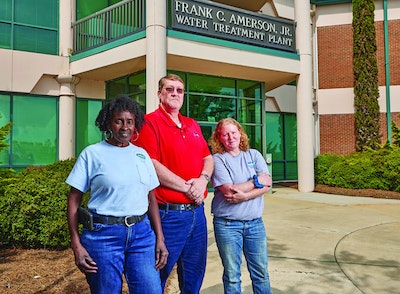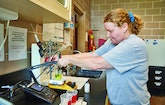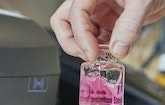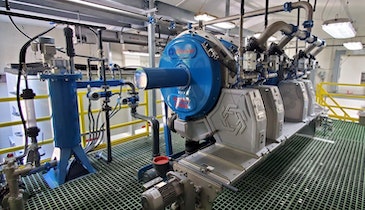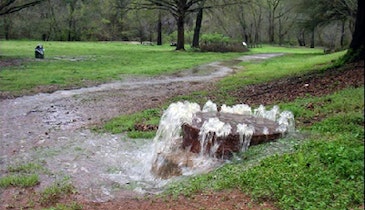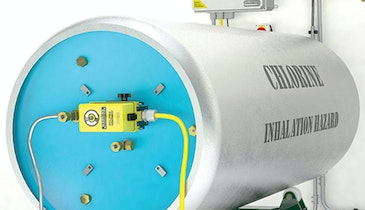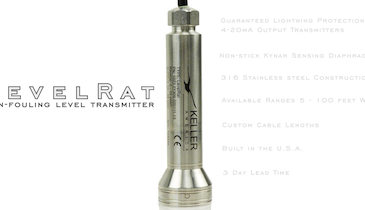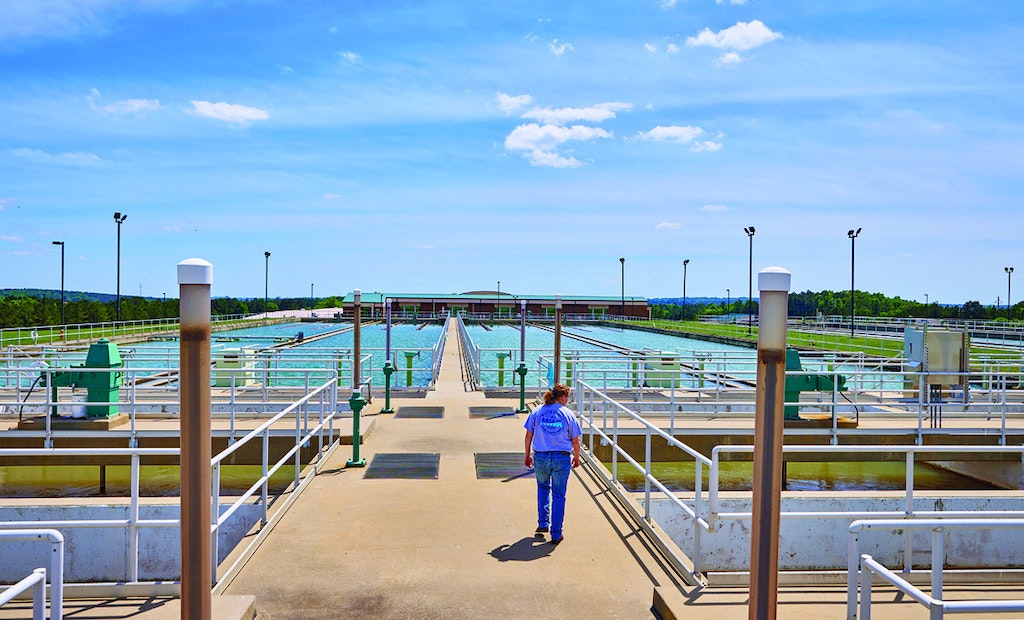
Christine Fowler was named Top Water Treatment Operator for 2022 by the Georgia Association of Water Professionals.
Christine “Cricket” Fowler is a perfect example of a trend in the water treatment field: women discovering room for professional training, growth and advancement.
Last year Fowler was recognized as Top Water Treatment Operator in District 5 by the Georgia Association of Water Professionals. She’s part of a team of similarly recognized operators at the Macon Water Authority’s Frank C. Amerson, Jr. Water Treatment Facility, a four-time winner of GAWP’s the Best-Operated Water Plant in Georgia award.
How did Fowler, who knew almost nothing about water treatment, rise to Class 2 Water Treatment Operator certification, with special interest in desalination and new technologies to produce quality drinking water? She worked for it.
Drawn to water
Fowler’s work life started in the military U.S. Army at Fort Benning, Georgia. Then she joined the CSX Railroad in Hamlet, North Carolina, and was cross-trained in many crafts, along the way gaining various certifications. She later moved to Georgia to be closer to family, started a course in occupational safety and health management at Georgia Tech, and became certified at Georgia Military College to operate forklifts.
Looking for her next job, she applied at Loram Maintenance of Way, which services railroad bed infrastructure; Contour Airlines, which had opened direct service from Macon to Washington, D.C.; and the Macon Water Authority, which was looking for new water treatment operators.
She wasn’t sure why, but the MWA position intrigued her. “Something told me I needed to take this job, and I kept calling them,” she recalls. “I had no water treatment experience.” What she did have was “a lot of industrial experience and a lot of fortitude. I have gumption, and I always want to learn. I kept calling back enough that they finally gave me a shot. If I could get into the interview, I knew I could sell myself.”
Offered the job, she jumped into her trainee position. After her probationary period, she immediately began studying for her Class 3 operator certification. Moving quickly through up to Class 2, she also received her lab analyst license, which came about in an unusual way.
Her supervisor accidentally signed her up for the wrong exam, but she took it anyway, since she had paid for it and couldn’t get her money refunded. She passed, and the effort wasn’t wasted:
“It’s been very helpful because it gives you a lot of cornerstone information. It helped me become a better operator, and it also helps people around me.”
Coming into her own
Fowler’s first on-the-job trainer was Ronald Eugene Evans, water plant operator. “An old hand with wastewater treatment first, he was very, very good.” she recalls. “Very thorough, strict and commandeering.”
Another colleague who helped bring her up to speed was operator Brian McDade. He deconstructed complex concepts in a way that reached her: “I’m not as good in math as I am in physics. If you break it down for me so I can understand the cogs and wheels and what’s affecting what, it simplifies it for me and makes the math easier.”
She feels blessed to have had such patient, thorough mentors during her training and appreciates their hands-on approach. “Those two truly know the plant. They understand it with their eyes closed. You can call them on the phone and get a consultation. That’s better than any assistant manager who doesn’t know what’s going on day to day, because they’re in the office.”
Now Fowler is helping mentor a new crew that recently came on board, to fill out a 10-person facility staff. They include operators Ronald Eugene Evans, Dale Morehead, Brian McDade, Jeffrey Pehlke, Ronald Braswell, Dale Dutcher, Ronald Bales, David Keene and Jonathan McNatt (also a water lab analyst).
Close collaboration
On a 3,125-acre property, that staff runs the Amerson plant to draw water from the 581-acre, 5.8 billion-gallon Javors Lucas Lake. Production capacity is 76 mgd, permitted for 60 mgd, and expandable to 90 mgd for the future.
Macon Water’s storage system includes four clear wells totaling 20 million gallons, plus 10 elevated and 10 ground storage tanks holding a total of 19.9 million gallons. Finished water is distributed through 1,409 miles of water main and nine pumping stations, providing nearly 26 mgd on average to about 55,000 customers.
Fowler’s duties consist of working with her team to test samples in the lab, perform equipment inspections, monitor lift stations and operate the treatment process, storage and distribution. They also monitor customer telephone inquiries, outage reports and service requests. Some arrive via email through the contact form on the authority’s website, but emergencies arrive by phone.
Based on the nature of those calls, Fowler may have to contact the on-call personnel to address trouble spots for service. A SCADA system helps the team monitor and control operations and address issues promptly.
For customer requests for emergency service, operators consult the plant’s computer-based Cayenta Customer Information System, which ties into the authority’s Cityworks enterprise management software.
Lab work is a regular part of operators’ duties: “We go into the lab every hour, on the hour, pull samples from each point in our process and run up to 15 separate tests. Also, we test for aluminum, manganese, fluoride, iron, hardness and alkalinity. And if you’re the first person of the day, you’ve got all that, plus the jar test.”
Lastly, there are maintenance and repair issues: “We do constant facility inspections. As operators, we are relied on to observe issues throughout our plant that need addressing.
Making water
The Amerson plant uses conventional treatment with coagulation, flocculation, sedimentation and filtration. Raw water from the Javors Lucas Lake goes through rough screening and then to pretreatment with chlorine dioxide to oxidize iron and manganese. Aluminum sulfate is added as a coagulant before flocculation. The water travels the length of the basins while settling occurs.
Sludge from the bottoms of the sedimentation basins is pumped to the authority’s wastewater treatment plants. The water is then filtered with granular activated carbon in 10 filter beds. Fowler credits this media for the authority’s winning the Best Tasting Water in the United States in 2009, and the Best Tasting Water in Georgia award in 2023.
After the water has filtered, it is treated with phosphate and lime for pH and corrosion control, fluoridated, and disinfected with chlorine to ensure a proper residual. The finished water is stored in clear wells totaling 20 million gallons before distribution.
How it happens
Essentially, Fowler functions as a pair of eyes, ears and hands, playing director to a stage filled with up to 15 other workers, most of whom are not on site. They’re assigned to other parts of the treatment or distribution system and are called out when she needs them. She’s generally one of two operators on site, one inside and one outside, working in six-month rotating shifts.
She sees her biggest success as learning from co-workers and being adaptable: “I know how to acquire usable knowledge. I’m taking it in and not taking it for granted. I’ll change something I’m doing in a skinny minute if I find an easier, more efficient way, just as long as it’s safe and gets a good quality result.”
She’s committed to enlarging and refining her computer skills and to continuing her formal education. “I would like to get a bachelor’s in applied science,” Fowler says. “I have a lot of college credits, but I need some more specific science courses. And I would like to learn more about desalination, because I think that’s an option in the future for dwindling water resources.”
She’s open to new ideas and developing technologies: “What if there is a better and more efficient way to complete the process? What if it’s cleaner and easier on the environment? It’s just better all the way around to work smarter, not harder.”
Recipe for success
Fowler isn’t sure why she won her Top Water Treatment Operator award, but she knows why she’s successful in her everyday duties. “You have to accept the entire team, not just your local plant,” she says. “Every part of your organization is your team, from distribution to drinking water treatment, to wastewater treatment.
“Everyone needs the power to make professional decisions on the fly, and you have to call the team. If we can’t do it on our own, our job is to know who can best help get it done safely and efficiently.”
She is bullish on the future of the industry and enthusiastic about endorsing it as a career: “There are so many options for somebody with this type of training. You could go to work in a private industry, you could work for airlines, you could work for a municipal treatment plant.”
She believes people who are energetic have a bright future replacing those retiring from the industry. The key, she says, is to pay attention, notice things, and remember not to go it alone: “It’s all about the team. It takes a village.”
